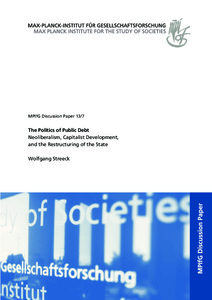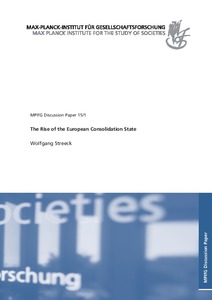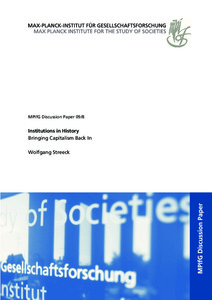-
1by Streeck, Wolfgang“…"Rising public debt has been widespread in democratic-capitalist political economies since the 1970s, generally accompanied among other things by weak economic growth, rising unemployment, increasing inequality, growing tax resistance, and declining political participation. …”
Published 2013
TEXT -
2
-
3by Streeck, Wolfgang“…The capitalist system is stricken with at least five worsening disorders for which no cure is at hand: declining growth, oligarchy, starvation of the public sphere, corruption and international anarchy. …”
Published 2016
TEXT -
4by Streeck, Wolfgang“…He analyses the subsequent tensions and conflicts involving states, governments, voters and capitalist interests, as expressed in inflation, public debt, and rising private indebtedness. …”
Published 2014
TEXT -
5by Streeck, Wolfgang“…"The rise of the consolidation state follows the displacement of the classical tax state, or Steuerstaat, by what I have called the debt state, a process that began in the 1980s in all rich capitalist democracies. Consolidation is the contemporary response to the "fiscal crisis of the state" envisaged as early as the late 1960s, when postwar growth had come to an end. …”
Published 2015
TEXT -
6by Streeck, Wolfgang“…Central concepts around which future work in institutionalist political economy may be organized are suggested to be history, development, evolution, and capitalist development. The general idea is that social science stands to benefit, not from ever-advancing abstraction and generalization, but on the contrary from fitting its theoretical template to the historical specificity of the society it is dealing with…”
Published 2009
TEXT -
7by Streeck, Wolfgang“…"Sociologue de l'économie, Wolfgang Streeck analyse la crise de 2008, crise financière et fiscale, non pas comme un événement singulier, mais comme une séquence de l'évolution de l'économie capitaliste depuis 1945. Plus particulièrement de ce que l'auteur appelle le " capitalisme démocratique ", ce régime économique de l'Etat-providence qui, jusqu'aux années 1970, achetait, par l'emprunt et le crédit, l'adhésion des populations occidentales grâce à la promesse d'un constant progrès de leur condition sociale. …”
Published 2014
TEXT






